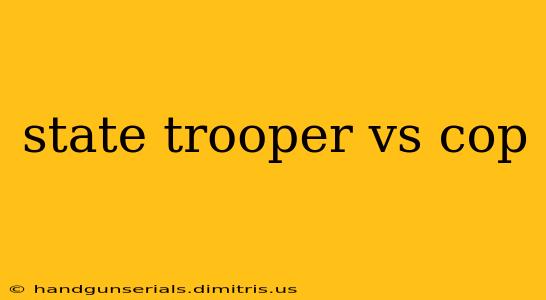The terms "state trooper" and "cop" are often used interchangeably, leading to confusion about their distinct roles and jurisdictions. While both are law enforcement officers, there are key differences in their authority, responsibilities, and areas of operation. This article will clarify these distinctions, exploring the specific functions and jurisdictions of state troopers and other police officers.
What is a State Trooper?
State troopers, also known as highway patrol officers or state police, are law enforcement officers employed by a state government. Their primary jurisdiction is typically statewide, although their responsibilities can vary from state to state. This broad jurisdiction sets them apart from municipal police officers, whose authority is generally limited to a specific city or town.
Key Responsibilities of State Troopers:
- Highway Patrol: A significant portion of a state trooper's duties involves patrolling state highways and interstates, enforcing traffic laws, investigating accidents, and providing assistance to motorists.
- Criminal Investigations: State troopers often investigate major crimes, such as homicides, drug trafficking, and organized crime, especially in areas outside of municipal police jurisdictions.
- Specialized Units: Many state police agencies have specialized units, such as SWAT teams, K-9 units, and forensic investigation teams, to handle complex or high-risk situations.
- Emergency Response: State troopers frequently respond to emergencies, including natural disasters, civil disturbances, and large-scale events.
What is a Cop (Police Officer)?
The term "cop" is a colloquialism for a police officer. Police officers are employed by local, county, or municipal governments and their authority is generally confined to the specific geographical area they serve. Their responsibilities differ significantly depending on the size and type of the community they police.
Key Responsibilities of Police Officers:
- Local Law Enforcement: Police officers are primarily responsible for maintaining order, responding to calls for service, investigating crimes, and enforcing laws within their designated jurisdiction.
- Community Policing: Many police officers engage in community policing initiatives, fostering relationships with residents and addressing local concerns.
- Traffic Enforcement: While state troopers focus on highways, police officers handle traffic enforcement within their city or county limits.
- Crime Prevention: Police officers often implement crime prevention programs, such as neighborhood watch initiatives, to reduce crime rates.
Key Differences Summarized:
| Feature | State Trooper | Police Officer (Cop) |
|---|---|---|
| Jurisdiction | Statewide | Local (city, county, municipality) |
| Primary Focus | Highway patrol, major crimes, statewide issues | Local law enforcement, community policing |
| Employer | State government | Local, county, or municipal government |
| Training | Typically more extensive initial training | Training varies depending on the agency |
| Equipment | Often equipped for longer distances and varied terrains | Equipment tailored to local needs |
Overlapping Responsibilities:
It's important to note that some overlap exists between the responsibilities of state troopers and police officers. For example, both may respond to traffic accidents, investigate crimes, and make arrests. However, the geographical scope and the types of crimes they typically handle differ significantly.
Conclusion:
Understanding the difference between a state trooper and a police officer is crucial for appreciating the complex structure of law enforcement. While both serve to protect and serve, their jurisdictional boundaries and primary duties distinguish their roles within the larger framework of public safety. This distinction highlights the diverse nature of law enforcement and the various levels of authority operating within a given region.

